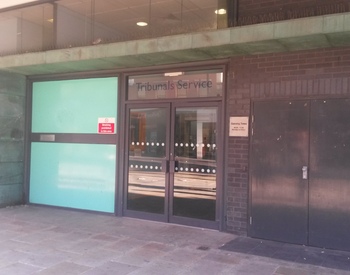The number of courts sitting at Scotland's only asylum and immigration court reduced from five or six a day to only two
The Herald reported yesterday that the UK government has severely cut the number of cases which are heard at the First-tier Tribunal Immigration and Asylum Chamber at the Eagle Building in Glasgow, the only regularly sitting body in Scotland which deals with immigration and asylum cases.
 According to The Herald, the Ministry of Justice has "slashed" the number of courts sitting from five or six a day to only two.
According to The Herald, the Ministry of Justice has "slashed" the number of courts sitting from five or six a day to only two.
In response, a spokeswoman for the Scottish government called for control of Scotland's only asylum and immigration court to be to handed to Scottish ministers, saying any changes that "deny access to justice" are "extremely worrying".
"We are not content with how migrants are currently treated and any changes made by us would be done with the aim of dealing efficiently with applications and treating migrants with the dignity and respect they deserve," the Scottish government spokeswoman said.
Immigration lawyers told The Herald that the dramatic reduction in court hearings could leave asylum seekers waiting up to a year for their applications to be heard.
The Herald quoted one unnamed lawyer as saying: "I suspect that it will be unworkable. The first issue will be about access to justice, where appeal hearings are listed months away. It wouldn't surprise me if we returned to the situation - which some English hearing centres currently have - where appellants are given hearing dates which are eight or nine months away, or more."
Another lawyer warned: "These delays have a knock on effect. Family members can be separated for longer. People awaiting cases may spend longer in detention. The costs of such detentions are significant. Asylum seekers may have to wait longer before they are in a position to work and contribute to society. They spend longer on benefits. If the purpose of any reduction is to save money, it will have a knock on effect causing greater cost to the taxpayer elsewhere."
A HM Courts and Tribunals Service spokesman told The Herald: "Following the implementation of the Immigration Act 2014, we expect a sizeable reduction in the number of appeals and have therefore reduced the number of judicial sitting days in the Immigration Tribunal."